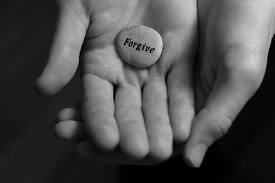While many of us might think of forgiveness as something we do for others to reduce their suffering, there are now many studies that show when we achieve forgiveness, it has the power to transform our own health and sense of inner peace.
The daily news is filled with unimaginable events. People harm and kill others, parents violate and abuse their own children, and children murder their own parents. It is often difficult for us to forgive even benign events in our relationships (such as a perceived insult or rejection) let alone something of such immense tragedy. The idea of letting go of a grievance against someone who has perpetrated such acts seems impossible.
The simple act of “holding a grudge” against another person can create chronic stress and ongoing feelings of anger and frustration. This chronic emotional response to a perceived insult can result in our becoming sick and even developing ongoing, chronic disease states such as hypertension, asthma or digestive problems.
You will notice the reference to “perceived insults” or wounding that we might feel. This is because while people can do the unimaginable, much of what we experience in our lives is a perceived hurt of rejection that causes us not to forgive another.
Several years ago at the program where I teach, the National Institute of Whole Health, had the pleasure of Fred Luskin, PhD, founder of the Stanford University Forgiveness Project, present his work on forgiveness at the medical center where we train credentialed health professionals in whole person health care.
Dr. Luskin is the author of the book Forgive for Good, and a world renowned researcher on the subject of forgiveness. His scientific studies demonstrate the healing power and health benefits from the process of forgiving others for either actual or perceived transgressions against ourselves, or to those we love. Dr. Luskin was the lead researcher on a study in Ireland which included individuals from both sides of Northern Ireland’s civil war. These individuals had all lost a loved one due to the country's civil conflict.
In his groundbreaking book, Forgive for Good, he outlines what forgiveness is—and, what it is not:
“Forgiveness is for you and not the offender”
“Forgiveness is about your healing and not about the people who hurt you”
“Forgiveness is taking responsibility for how you feel”
“Forgiveness is a trainable skill – just like learning to throw a ball”
“Forgiveness is a choice”
“Forgiveness is not condoning unkindness or poor behavior”
“Forgiveness is not forgetting that something painful has happened”
“Forgiveness does not mean reconciling with the offender”
“Forgiveness does not mean giving up your feelings”
So then what does forgiveness mean? Forgiveness means being willing to find new ways to experiencing “justice” and to choose not to be victimized by other’s choices or actions. It can also mean experiencing an event from a different perspective which allows us to reclaim our life even from the depths of our suffering, loss or despair.
Forgiveness has been scientifically proven to decrease depression, increase hopefulness, decrease anger, increase self-confidence, enhance relationships, decrease stress and physical symptoms of illness, decrease heart disease and increase immune function. Forgiveness is a gift we give to ourselves that helps us live more peace-filled, healthier lives. There are many excellent books on the subject to assist with and facilitate the process of forgiving what seems to be the unforgiveable.
Copyright 2012 Georgianna Donadio All Rights Reserved

